
Gliding by the Light of The Red Lantern
The internet’s obsession with pups has deep gradations, a hue for every interest. Breeds, jokes, potential for interactive pats, the worlds interlinked computers cater to all doggo tastes, like most things. So it wasn’t surprising to see musher Twitter take off, only that it didn’t launch sooner.
Friends of mine (and yours, likely) have been following dogsledders like Blair Braverman and many other mushers online as they traverse the Iditarod trail across Alaska, eyeing sat trackers and maps, sharing photos and (I presume, hope, dream) filling out their own fantasy sled-dog drafts. Through their likes and faves I’ve dipped some toes into this wild world, full of interspecies cooperation, astounding images, and pizza pit stops. And once The Red Lantern was announced, these friends were sure to make me very aware.
This upcoming rogue-lite adventure novel has been two years in development, a bit before the annual Alaska race crashed through puppy Twitter, but happy to ride some of those waves nonetheless. Timberline Studio Co-Founder Lindsey Rostel told me that she was already infatuated with crossing the ice by authors like Gary Paulsen and Jack London of course, but those childhood adventures were rekindled by a trip to Iceland. She mentioned the idea over coffee to her studio co-founders, and they went very quickly from notion to jam.
At this point, The Red Lantern is focusing on the narrative of a young woman reconnecting with nature, animals, and herself, but it isn’t strictly linear. There are branched choices, variance in the stories that players are able to assemble, and lots of dogs with a broad swath of personalities. Classics like The Oregon Trail are also benchmarks for Rostel and the team, where they want choices to matter but not always in a strict succeed/fail spectrum, though it is possible for the player to do everything wrong and end up back at the beginning, nodding off in their truck, dreaming about the possibilities ahead.
In my time with the demo, I had many encounters with wildlife, one of which proved fatal. You shouldn’t get too close to elk in games or in Alaska, which, noted. Rostel told me this was actually somewhat rare in the game, which tracks with my usual flavor of luck. She says that when she plays she tends to let the dogs slaughter the squirrels as she is not a fan, but there’s no real benefit to it; they’re hoping to let the choices be the foundation of your narrative, other than a strict loss/gain/benefit ratio.
And they’ve put skis on the snow for research as well, heading up north to learn from the real team leaders racing along the Iditarod. The mushers have helped inform the looks of the sleds, the threats players might face, and the many temperaments of your four-legged colleagues. They’ve also commissioned videogame voiceover master Ashly Burch and soundscapes from Hrishikesh Hirway, original host of the excellent podcast Song Exploder and creative force behind The One AM Radio. The Red Lantern is stocked to tell a story of failure and picking one’s self off the ground and learning from that failure, with rich atmosphere sonically and visually.
Ultimately, Timberline is hoping to provide a chilly playground while spinning some yarns—the game has certainly expanded from their initial vision into some branching fiction that the player stitches together in their own way. From what I’ve played, The Red Lantern has the potential to paint the quiet charms of Alaska, the splendid joys of traipsing across the tundra, almost alone and never quite at the same time.
// Levi Rubeck is a critic and poet currently living in the Boston area. Check his links at levirubeck.com





